Publications

🌐suivre Marie-Anne Frison-Roche sur LinkedIn
🌐s'abonner à la Newsletter MAFR Regulation, Compliance, Law
____
► Référence complète : M.-A. Frison-Roche, "L’obligation de compliance, entre volonté et consentement : obligation sur obligation vaut", in M.-A. Frison-Roche (dir.), L'obligation de Compliance, Journal of Regulation & Compliance (JoRC) et Dalloz, coll. "Régulations & Compliance", 2024, à paraître
____
📝lire l'article
____
🚧lire le document de travail bilingue sur la base duquel cet article a été élaboré, doté de développements supplémentaires, de références techniques et de liens hypertextes
____
📕lire une présentation générale de l'ouvrage, L'obligation de Compliance, dans lequel cet article est publié
____
► Résumé de l'article (fait par le Journal of Regulation & Compliance - JoRC) :
________
Feb. 9, 2024
Conferences

🌐follow Marie-Anne Frison-Roche on LinkedIn
🌐subscribe to the Newsletter MAFR Regulation, Compliance, Law
____
► Full Reference: M.-A. Frison-Roche, "Préalable : ce qu'est un engagement" ("Prerequisite: the Commitment"), in L. Aynès, M.-A. Frison-Roche, J.-B. Racine and E. Silva-Romero (dir.), L'arbitrage international en renfort de l'obligation de Compliance (International Arbitration in support of the Compliance Obligation), Journal of Regulation & Compliance (JoRC) and Institute of World Business Law of the ICC (Institute), Conseil Économique Social et Environnemental (CESE), Paris, February 9, 2024
____
🧮see the full programme of this event
____
🌐consult on LinkedIn a general presentation of this event, which links to a presentation of each speech (in French)
____
____
🔲see the slides used to support the presentation (in French)
____
🎤see a presentation of the conference "Préalable : ce qu'est l'Obligation de Compliance" ("Prerequisite: what is the Compliance Obligation"), given at the same symposium
____
🎤see a presentation of the conference "Le renforcement des engagements de Compliance par le renvoi Ex Ante à l'arbitrage international" ("Reinforcing Compliance commitments by referring Ex Ante to International Arbitration") which was finally not pronounced but will be the subject of an 📝article in the forthcoming book 📘Compliance Obligation
____
► Presentation of the conference: Having defined the Compliance Obligation in "Préalable : ce qu'est l'Obligation de Compliance" ("Prerequisite: what is the Compliance Obligation"), I set out to define what a commitment is.
No one doubts that commitments, as words, constitute facts that can engage the liability of companies if there are inconsistencies or lies. The question today is whether a commitment can constitute a legal act, binding in ex ante.
Companies make commitments either to fulfil their legal Compliance obligations, which is simply obeying the law, or to express their own wishes, either for themselves or for others. The cases are often confused, even though the scope is not the same.
If the commitment takes the form of a contract, Compliance is concerned if the contract is used as an Ex Ante Compliance Tool📎
The commitment, a concept that comes more from the Economics of Regulation, was conceived between a Regulatory Authority and a Company: it is the unilateral decision of the Authority that gives legal force to the commitment. Case law confirms this (Conseil d'État (French Council of State)📎
If commitment is central to Compliance, particularly Vigilance, it is because Compliance Law is an extension of Regulatory Law📎
In drawing up a plan, the company is fulfilling its legal obligation. But if we were to consider that it is a commitment, then we would also have to consider that the plan is the result of its will, that it must consult the stakeholders in its preparation, but that the source of the plan is its will: the provisions are not stipulations, are not applications of the law, but unilateral voluntary provisions.
In this respect, and because its source is the will of the company (which does not prevent its co-construction), a plan could contain a "graduated offer" of arbitration.
This offer could be included in commitments that are less regulated by law, such as those made in the context of CSR.
________
🕴️M.-A. Frison-Roche (ed.), 📘Compliance Tools, 2021.

Feb. 9, 2024
Organization of scientific events

🌐follow Marie-Anne Frison-Roche on LinkedIn
🌐subscribe to the Newsletter MAFR Regulation, Compliance, Law
____
► Full Reference: L. Aynès, M.-A. Frison-Roche, J.-B. Racine and E. Silva-Romero (dir.), L'arbitrage international en renfort de l'obligation de Compliance (International Arbitration in support of the Compliance Obligation), Journal of Regulation & Compliance (JoRC) and Institute of World Business Law of the ICC (Institute), Conseil Économique Social et Environnemental (CESE), Paris, February 9, 2024
____
____
🏗️This symposium takes place in the cycle of symposiums organised by the Journal of Regulation & Compliance (JoRC) and its partners Universities, focusing in 2023-2024 on the general theme of the Compliance Obligation
____
📚The works will then be inserted in the books:
📕L'obligation de Compliance, to be published in the 📚Régulations & Compliance Serie, co-published by the Journal of Regulation & Compliance (JoRC) and Dalloz, published in French.
📘Compliance Obligation, to be published on the 📚Compliance & Regulation Serie, co-published by the Journal of Regulation & Compliance (JoRC) and Dalloz, published in English.
____
► General presentation of the symposium: "Compliance Obligation" appears to be far from International Arbitration if Compliance Law is only understood in terms of binding regulations or even Criminal Law. Arbitration would only have contact with Compliance Obligation in a repulsive way, when a person claims to have enforced a contract before an arbitration court that disregards a compliance prohibition, e.g. corruption or money laundering. It is therefore from a negative angle that the cross-over has taken place.
The fact that Arbitration Law respects the requisite of Criminal Law is nothing new. Moreover, the power of Compliance in its detection and prevention tools, particularly in terms of evidence, no doubt increases the global efficiency.
But Compliance Obligation is based on Monumental Goals, notably linked to global human rights and active ambitions about environment and climate which, particularly in the value chain economy, take the legal form of compliance clauses, or even compliance contracts, or various commitments and plans, which the parties can ask the international arbitrator to enforce. They will do so even more as arbitrators are often the only international, or even global, judges available.
The use they will do of Contract Law, Quasi-Contract Law, Enforcement Law, Tort Law, reinforces Compliance Law in a global dimension.
____
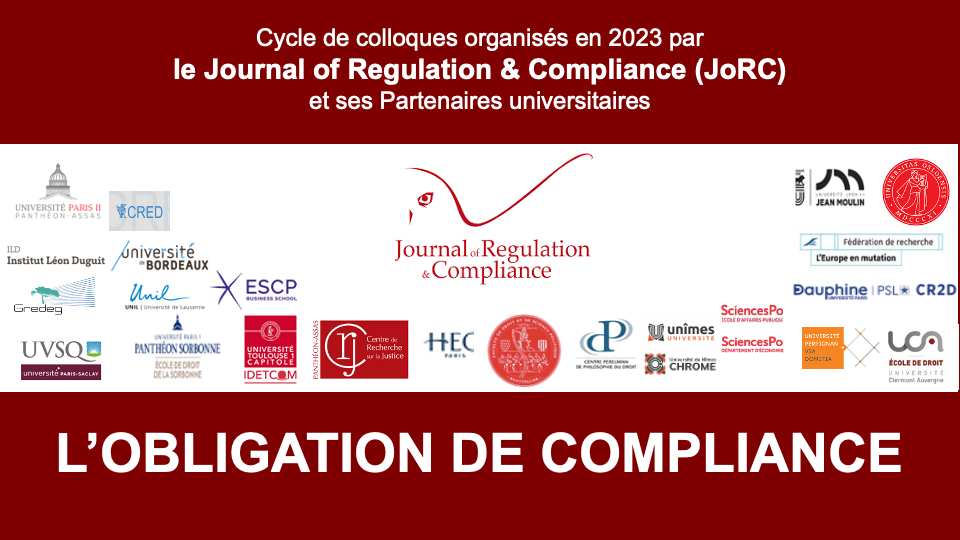
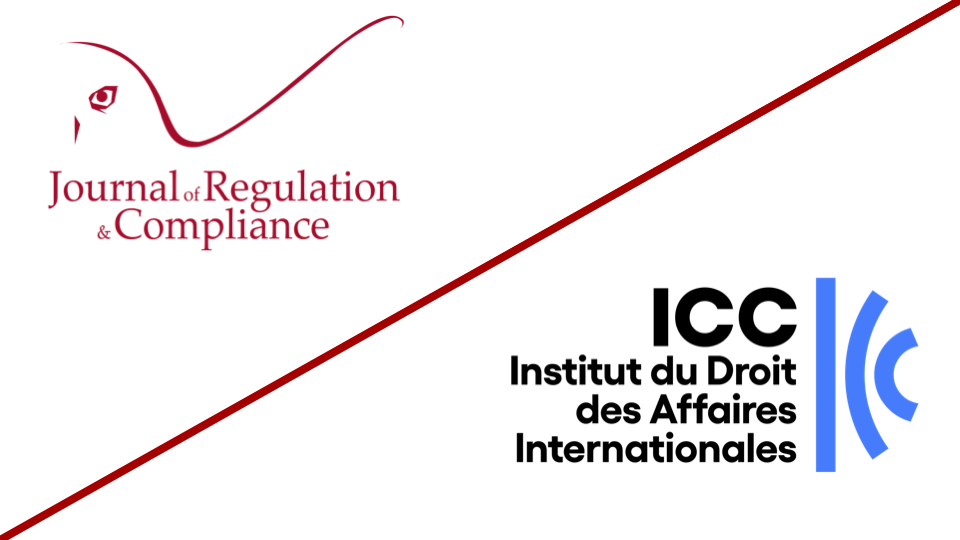
____
► Interviennent :
🎤 Laurent Aynès, emeritus Professor at Paris 1 Panthéon-Sorbonne University, Attorney, Darrois Villey Maillot Brochier (Paris)
🎤 Marie-Anne Frison-Roche, Professor of Regulatory and Compliance Law, Director of the Journal of Regulation & Compliance (JoRC)
🎤 Jean-François Guillemin, former General Secretary of the Bouygues Group
🎤 Christophe Lapp, Attorney, Advant Altana (Paris)
🎤 Jean-Baptiste Racine, Full Professor at Paris Panthéon-Assas University (Paris 2)
🎤 Eduardo Silva-Romero, President of the Institute of World Business Law of the ICC (Institute), Attorney, Wordstone (Paris)
____
🧮Read a detailed presentation of the event below⤵️
March 15, 2023
Conferences
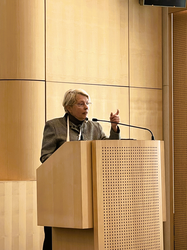
► Full reference: M.-A. Frison-Roche, "Pourquoi le Droit de la Compliance ?" ("Why Compliance Law?"), in Roman Aydogdu et Hans De Wulf (dir.), Bruxelles, 15 march 2023.
____
🧮Read the full programme of this event
________
Sept. 1, 2021
Compliance: at the moment

► An article published on July 14, 2021 by The Wall Street Journal, "Brain Implant Lets Man 'Speak' After Being Silent for More Than a Decade", relays the information that it is now possible, on an experimental basis, to implant in the brain a device allowing a person deprived by a neurological accident to speak to be able to express himself again by writing his thoughts directly on a computer screen, on which the words thought are displayed in sentences.
____
Several years of "fundamental" research, notably on the part of Facebook, which, in particular by subsidizing the French professor of neurosciences Stanislas Dehaene, in a comparison between the learning development of the brain and the development of "deep learning", have been successful. to allow people who have lost the use of the voice to write directly on screens without this vocal medium by going directly from thought to writing.
This leads to three reflections, putting Law and Technology at the center:
1. at first glance, speech being only a medium between thought and expression, it would be conceivable to do without it;
2. However, it is required to draw a parallel with the new technology of "emotional recognition" by which thoughts are accessible to third parties, which thwarts the fundamental right to make one's thoughts inaccessible to others;
The news has shown precisely that this technology, making possible to capture the true thoughts of others despite feigned facial expressions, poses a problem with regard to the fundamental right to lie or to remain silent (see in this regard 📧 MaFR, "Compliance and Ethics Technologies may be inadmissible "in themselves" and conceiving of their "ethical use" is therefore not admissible: practical case on the control of workers' emotions ").
3. By anticipating the possible use of this new technology and the legal reaction to this potentiality, the same question raises whether, per se, such an implantation of a tool for "capturing thoughts directly in the brain" to obtain their "direct translation on a screen" should not be considered as the equivalent of capturing thoughts, just as infringing on everyone's fundamental right to keep their thoughts inaccessible.
Here again, the fact that in one or two cases, this made it possible to cure a person does not legitimize the technology in itself.
Likewise, the fact that the person "consents" is not sufficient to legitimize what may be a per se attack on the dignity of the human person if the technology has the effect of capturing thoughts with a loss of control. the person concerned. For the moment, in the description given by the researchers according to the article which relates the innovation, it is the transmitter who controls the technology but the elimination of the medium of speech or writing deserves to be conceptualized, in the loss of isolation of the individual, isolation to which the Western tradition has often associated Freedom.
_____
Sept. 8, 2019
Blog
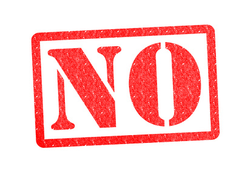
I go. In accordance with the European Regulation (GDPR) transposed into French legal system, the site informs that there is possibility for the user to accept or refuse the use of their personal data for the benefit of "partners".
If they continue reading, the user is supposed to accept everything, but they can click to "customize".
I click: there I find two options: "accept everything" or "reject everything". But the "reject all" option is disabled. It is only possible to click on the "accept all" option.
It is stated in a text, which can not be copied, that these "partners" can use my data without my consent and for purposes that they do not have to inform me. But, again, these things I can "refuse everything". Here again the "reject all" mention exists but the fonctionality is not active, while the mention "accept all" is an active fonctionality.
While believing to read a free article on the "right of the trees".
At the end, I do not read this article, since I did not click on the only active buttons: "accept everything".
In exchange for a whimsical article about trees and their rights, or creams to be always young, or celebrities who change spouses, or about so-called tests to find what king or queen you should be if the all recognized all your merits, etc.
Proposed on the digital news feed by unknown sites; in partnership with foreign companies that you will never reach.
And mass-viewed by Internet users who are also told that "consent" is the proven solution for effective protection ....
While these are just panels hastily built by new Potemkins ...

Aug. 2, 2018
Publications
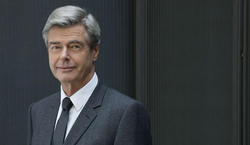
► Complete reference: Frison-Roche, M.-A., Yes to the principle of the will, No to the pure consents, working document for an article written in French Oui au principe de volonté, Non aux consentements purs, to Mélanges dedicated to Pierre Godé, 2018, available at http://mafr.fr/ en / article / yes-in-principle-of-the-desire-not in the consent /
► Summary: Pierre Godé devoted his thesis to defend the freedom of the human being, freedom that the person exercises by showing his will. This will manifests itself, even tacitly, by this trace of "consent". In a liberal society, politically and economically, that is to say a society based on the principle of the will of the person, consent must always be defined as the manifestation of the will, this link between consent and will being indivisible ( I). But by a perversion of liberalism, "consent" has become an autonomous object of the freedom of the person, mechanical consent that has made it possible to transform human beings into machines, machines to desire and machines to be desired, in a world of " pure consents","where we keep clicking, consenting to all without ever wanting. This consent, which has been split from the free will of the person, is the basis of the markets of the Human and the illiberal democracies, threats against human beings (II). The future of Law, in which Pierre Godé believed, is to continue to aspire to protect the human being and, without countering the free will of the human being as the movement of the law of the consumption had been tempted to, to renew with a liberal movement of Law and to fight against these systems of pure consents (III).
🔻read the article below (in French).
Dec. 2, 2017
Blog

Le journal Le Monde dans son édition du 2 décembre 2017 raconte un cas, sans doute inédit, que le journaliste a lui-même lu dans une revue de médecine. Aussi repris par d'autres journaux, comme L'express.
Mais prenons le cas d'une façon plus juridique.
Et que l'on soit en système juridique de Common Law ou en système de Civil Law, un cas inédit est toujours une occasion de réfléchir.
LE CAS
En l'espèce, arrive à l’hôpital de Miami un homme de 70 ans. Il n'a plus conscience, non pas du fait de son âge mais en raison de l'alcool et n'a pas de papier d'identité. L'équipe médicale s'apprête à le réanimer, ce qui est techniquement est l'acte qui s'impose. Mais sur sa peau est tatouée la mention : "ne pas réanimer", le mot "pas" étant souligné et la mention étant signée.
LA QUESTION
Que doit faire le médecin ?
L'ANALYSE JURIDIQUE DU CAS POUR RÉPONDRE A LA QUESTION
La difficulté tient dans l'analogie à faire ou non entre un tatouage et d'autres modes d'expression de la volonté d'une personne.
En effet, lorsqu'une personne "parle", ou "écrit", elle exprime un "consentement", qui lui-même traduit en principe une volonté libre et éclairée. C'est le socle de la relation entre le médecin et le patient.En conséquence de quoi, si le patient exprime sa volonté de n'être pas réanimé, le médecin suivra cette expression de la volonté faite par le consentement.
Pourquoi l'analogie entre un tatouage et ce schéma pose problème ?
- à première vue, l'on peut dire que l'être humain s'exprime par d'autres mots que la parole et l'écrit. Ainsi, il y a de la jurisprudence pour dire que mettre une croix est une "signature" valable dès l'instant que le lien peut être fait entre "consentement" et la "volonté" est fait.
De la même façon, dans nos temps moderne, où l'écrit recule, pourquoi ne pas s'exprimer par le chant ? par une vidéo ? par un jeu où un avatar serait en train de mourir ? Pourquoi non ?
Car il n'y a pas de liste close sur la façon d'exprimer sa libre façon d'exprimer sa volonté, sur le mode d'expression de consentir.
Mais
Le problème vient justement du fait que ce lien entre cette expression ici exposée et ce qui est absolument être la source, à savoir une libre volonté maintenue de mourir, n'est pas acquis.
En effet, c'est la qualité de la volonté , exprimée d'une façon ou d'une autre, qu'il s'agit d'apprécier :
- Il doit s'agir d'une volonté maintenue de mourir. Pour s'en assurer, il faut que la personne puisse à tout moment renoncer à l'expression faite de mourir, par exemple en déchirant le papier, en faisant une déclaration contraire (en modifiant la déclaration faite au registre tenu par les services médicaux ad hoc). Or, le tatouage est définitif. Il ne permet pas techniquement cela; En cela, il ne peut pas techniquement exprimer une volonté maintenue. Et cela pour une raison paradoxale : c'est en tant qu'il est "définitif" qu'il n'existe pas une volonté chaque jour maintenue parce que chaque jour rétractable.
- Il doit s'agit d'une volonté librement et clairement exprimée. Dans les procédures d'écrits ou de prise de parole (car toutes ces "façons de faire" sont des "procédures"), l'on s'assure que la personne par son comportement (signer, relire, répéter, avoir des témoins, etc.) exprime sa volonté, emploie des mots pour le faire (par exemple : "je veux"). Certes, il y avait le soulignement du "pas" et une signature. Mais les tatouages sont parfois, voire souvent fait dans des circonstances où la personne ne se maîtrise plus tout à fait (sur quelle partie du corps ce tatouage était-il fait ?...). Or, lorsque la personne est arrivée à l'hopital, l'état d'ivresse était arrivée. Nous manquent deux éléments de fait : l'ancienneté ou non du tatouage ; la localisation du tatouage.
LA SOLUTION JURIDIQUE
Il n'y a pas de solution déjà arrêtée que l'on pourrait recopier,, tel l'élève sage. Il faut donc remonter plus haut, dans les normes fondamentales.
Il y en a deux : l'obligation du médecin de sauver les êtres humains (c'est son premier principe) ; la liberté de l'être humain de mourir (c'est sa première liberté).
Le cas met donc face à face deux principes fondamentales : la liberté de l'être humain d'une part (mourir), ce pour quoi les médecins sont faits (sauver).
Mais ici, il est acquis qu'il n'y a pas de doute sur le fait que les médecins étaient devant une personne qui allait mourir s'ils ne réanimaient pas. Alors qu'il y a un doute sur le fait que la personne dans l'expression qui est recueillie exprime véritablement sa volonté.
Il est incontestable que la question est donc une question probatoire.
C'est donc le principe qui est factuellement certain, face au principe qui est factuellement incertain, qui doit l'emporter.
La personne devait être réanimée.
QUE S'EST-IL PASSE EN L’ESPÈCE ?
Les médecins, dépassés et sans doute craignant une action en responsabilité, ont saisi le service de "l'éthique". Qui a dit que c'est "comme" un véritable message exprimant la volonté du patient. Celui-ci, non réanimé, est donc mort.
CONCLUSION : il faudrait apprendre aux médecins à faire des cas pratiques au regard des principes de droit.
July 2, 2015
Interviews

Référence complète : Frison-Roche, M.-A., GPA. Si l'on admet qu'un enfant peut être donné, alors il est traité comme une chose, Interview avec Carole Barjon, L'Obs, 2 juillet 2015.
Nov. 25, 2014
Teachings : Grandes Questions du Droit, Semestre d'Automne 2014
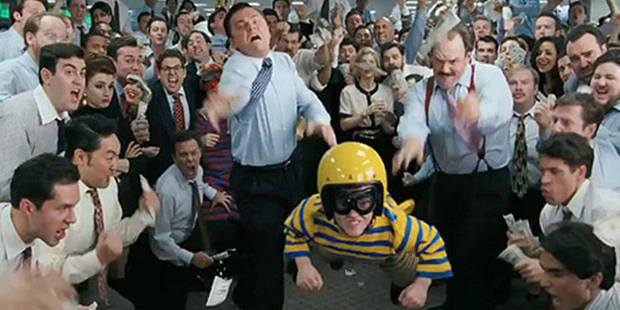 Classiquement le droit protégea les êtres humains en les recouvrant du masque de la personnalité, posant ainsi les poser comme libres et égaux en droit. Le premier choc qui conduisit à démasquer juridiquement l'être humain afin de le protéger directement fût le constat après la seconde guerre mondiale que le nazisme avait pu se construire aussi sur le droit et précipiter les êtres humains dans l'abîme. Les droits étant alors affectés directement aux êtres humains, dont la titularité de droits ne pouvait plus être déniée puisqu'ils sont êtres humains, la concrétude apparut, c'est-à-dire le corps. Intervînt le second choc, à savoir les biotechnologies, rendant aptes à dégager des produits et éléments du corps sans blesser ou tuer. Mais si la personne est hors-marché, son corps l'est-il ? Cette concrétisation va conduire le droit à revenir sur des distinctions jusqu'ici relativement sommaires, comme celle faite entre le mineur et le majeur, ou encore entre l'homme et la femme. A partir d'une identité sexuelle, le critère biologique de l'identité, puis de la filiation, sont en train d'être remis en cause.
Classiquement le droit protégea les êtres humains en les recouvrant du masque de la personnalité, posant ainsi les poser comme libres et égaux en droit. Le premier choc qui conduisit à démasquer juridiquement l'être humain afin de le protéger directement fût le constat après la seconde guerre mondiale que le nazisme avait pu se construire aussi sur le droit et précipiter les êtres humains dans l'abîme. Les droits étant alors affectés directement aux êtres humains, dont la titularité de droits ne pouvait plus être déniée puisqu'ils sont êtres humains, la concrétude apparut, c'est-à-dire le corps. Intervînt le second choc, à savoir les biotechnologies, rendant aptes à dégager des produits et éléments du corps sans blesser ou tuer. Mais si la personne est hors-marché, son corps l'est-il ? Cette concrétisation va conduire le droit à revenir sur des distinctions jusqu'ici relativement sommaires, comme celle faite entre le mineur et le majeur, ou encore entre l'homme et la femme. A partir d'une identité sexuelle, le critère biologique de l'identité, puis de la filiation, sont en train d'être remis en cause.
Cela accompagne ou traduit ce qui peut être un retournement juridique de situation, dont il n'est pas acquis qu'il soit favorable à tous les êtres humains. En effet, la pensée juridique de l'être humain se reconstruit sur la volonté, à partir de l'idée classique de la libre disposition de soi-même. Mais la personne juridique étant devenue "concrète", elle pourrait disposer de son corps dès l'instant qu'elle y consent. Le contrat devient la façon d'exprimer sa liberté. Il est aussi le mode de construction des marchés. Sont alors en train de se constituer des marchés des corps et des personnes désirés, le marché fonctionnant sur le désir. La Loi du désir, loi universelle, pourrait-elle transformer les uns en producteurs et les autres en consommateurs d'êtres humains, à travers notamment la prestation de gestation pour autrui ? Le transhumanisme, créant "l'être humain nouveau" achève-t-il la réification de l'être humain ?

Aug. 4, 2014
Publications
The family is built on one basic idea which is so powerful that legal rules are organised around it as spontanely. But if the paradigm is changing, then all the rules change with the strength of the evidence.
However, in the 1970s, we changed paradigm. Previously, for millennia, the basic idea was the family as a group. Depending on the time or period, the group has varied in its contours, squares and powers granted to individual members, but the idea of group was acquired. Family was a group which was a part of the social group, kept by the State.
From the 1970s, the family becomes the developed project done by a free and independent person. This project designed by a person wishing to build family that suits him or her will result in the fact that the individual meets other individuals whose family project crosses his or her. Contract becomes the perfect tool for these home-made families This desires adjustment corresponds to the market model. Concretely, market of ideal family provides services for satisfaction of various projects, all legitimate as expression of desir. The sufficient link between individuals is affection and will, the center is the child. The market offers new perspectives, such as ideal partner and even more perfect child, becoming jewel. The idea of Market has triumphed.
Updated: July 31, 2013 (Initial publication: Oct. 25, 2011)
Teachings : Les Grandes Questions du Droit, semestre d'automne 2011

Updated: July 31, 2013 (Initial publication: Sept. 20, 2011)
Teachings : Les Grandes Questions du Droit, semestre d'automne 2011

Updated: July 31, 2013 (Initial publication: Nov. 8, 2011)
Teachings : Les Grandes Questions du Droit, semestre d'automne 2011

March 14, 2013
Thesaurus : Doctrine
Référence complète : Catto, M.X., La gestation pour autrui : d’un problème d’ordre public au conflit d’intérêts ?, Revue des droits de l'Homme, mars 2013.
La thèse de l'auteur est de dire que le Droit peut se détacher de la nature physique, physiologique et construire sa propre réalité. Ainsi, la filiation serait une construction juridique pure. On pourrait ainsi dire qu'elle est établie entre l'enfant et ceux qui en ont eu le projet. Vouloir maintenir ce lien entre l'enfant et la femme du ventre duquel il est certain serait une "conception naturaliste du droit" qui ne s'impose pas.
Plan
Sept. 16, 2010
Thesaurus : 02. Cour de cassation
En 2009, des organisateurs avaient utilisé des cadavres chinois, disséqués et plastinés, pour exposer des postures, notamment sportives. La Cour d’appel de Paris avait interdit l’exposition car la preuve n’avait pas été rapportée que les personnes avaient de leur vivant donné leur consentement. La Cour de cassation, par un arrêt du 16 septembre 2010, a approuvé la solution, mais adopte un tout autre fondement : non plus subjectif (le consentement, la volonté), mais objectif (la dignité humaine). Cela est radicalement différent.
July 9, 2008
Thesaurus : Doctrine
June 28, 2000
Publications
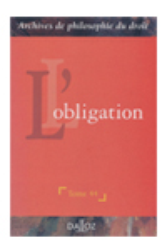
► Référence complète : M-A. Frison-Roche, "Volonté et obligation", in L’obligation, Archives de philosophie du droit, t.44, Sirey, 2000, pp.129-151.
____
____
► résumé de l'article : La première partie de l'article est consacrée à la place de la volonté dans son rapport avec l'obligation. Elle souligne que, notamment sous une influence kantienne, le monde est centré sur l'individu, lequel est pensé comme un être autonome et volontaire, en cela apte à s'obliger. S'élabore ainsi une séquence figée : personne-obligation-volonté. Dire l'un, c'est impliquer les autres. Retirer les uns, c'est rendre impossible les autres.
Le droit positif français, tel que la doctrine et la jurisprudence ont interprété le Code civil notamment, correspond à cette conception jusqu'à la seconde Guerre mondiale. On affirme souvent que depuis celle-ci, la volonté, et donc l'obligation comme engagement de l'individu libre, s'est retirée du système. Cela serait notamment l'effet du consumérisme, protégeant cet incapable que serait le consommateur sous le parapluie des lois multiples.
Il faut plutôt considérer que l'obligation dans son lien à la volonté demeure mais que le rapport est devenu triangulaire, comme l'a souligné le doyen Carbonnier. En effet, l'État s'est assis à la table contractuelle : il écrit le contrat, puisqu'il est d'adhésion. Mais c'est pour affermir la volonté du consommateur, la rendre plus éclairée, donc plus libre puisque plus rationnelle, que l'État intervient.
D'ailleurs, cela n'est pas si nouveau puisque depuis toujours, on soutient que la force obligation des conventions ne tient pas toute seule, par le seul effet de la volonté mais parce que la loi, par l'article 1134, al.1 du Code civil dispose que le contrat a force de loi entre les parties, c'est-à-dire parce qu'une disposition du droit objectif y oblige.
Ainsi, c'est un déplacement du rapport entre la volonté et l'obligation qu'a opéré le droit de la consommation et non pas à sa destruction. Bien au contraire, le droit de la consommation cherche à rendre réel ce que le droit traditionnel présumait, à savoir la volonté libre et éclairé de celui qui s'engage. On est passé du présumé, comme présupposé méthodologique, au concret recherché, comme projet de politique publique que constitue l'ambition consumériste.
L'obligation qu'impose la loi au professionnel apparaît ainsi comme une protection contre la volonté pure, qui n'est que l'expression des puissances, afin qu'apparaissent concrètement des volontés qui s'affrontent effectivement, y compris celle du faible consommateur.
La seconde partie de l'article cherche à montrer qu'il en est tout autrement si l'on se tourne du côté de l'économie et de la théorie du marché.
Celui-ci constitue une situation par rapport à laquelle la volonté s'ajuste différemment. En effet, la volonté de la personne en amont, lorsqu'il s'agit de décider d'entrer ou de ne pas entrer sur le marché. Mais une fois que la personne a exercé son libre choix (pour l'offreur de devenir fabricant ou commerçant, puis d'aller sur tel ou tel marché ; pour le consommateur d'aller sur tel ou tel marché), c'est le marché qui détermine les prix.
Ainsi, il y a dissociation entre la volonté et le consentement, puisque le consentement que le consentement donné par la partie dans chaque contrat à se soumettre à une obligation ne vient pas de sa volonté individuelle mais du mécanisme collectif du marché.
En outre, allant plus loin, dans une conception kantienne, la volonté est souveraine et l'obligation absolue. Mais l'homo economicus suit son intérêt. Ainsi, il exécute le contrat parce qu'il y a intérêt. S'il n'y a plus intérêt, il ne le fera plus, si les coûts de l'inexécution (procès, dommages et intérêts, temps, avocats, etc.) sont inférieurs à l'exécution. Ainsi, il n'y a plus d'obligation personnelle, il n'y a que des coûts dont le droit fait partie, y compris la règle selon laquelle les contrats sont obligatoires. Mais sur un marché, ils ne seront exécutés que si la partie y a intérêt.
Dès lors, la théorie du marché semble remplacer l'obligation par le concept d'intérêt. Mais le marché a pour qualité et défaut son caractère instantané , il est une succession d'instants, il varie à chaque instant, comme ses prix. Il est par nature risqué et insécure.
L'obligation juridique qui pose une action à faire, la même à travers la durée qui est fixée préalablement offre au marché ce dont il manque : la durée et la stabilité.
Cela montre d'une nouvelle manière que le marché ne peut pas se passer du droit, ici l'obligation juridique.
______
July 4, 1957
Thesaurus : Doctrine
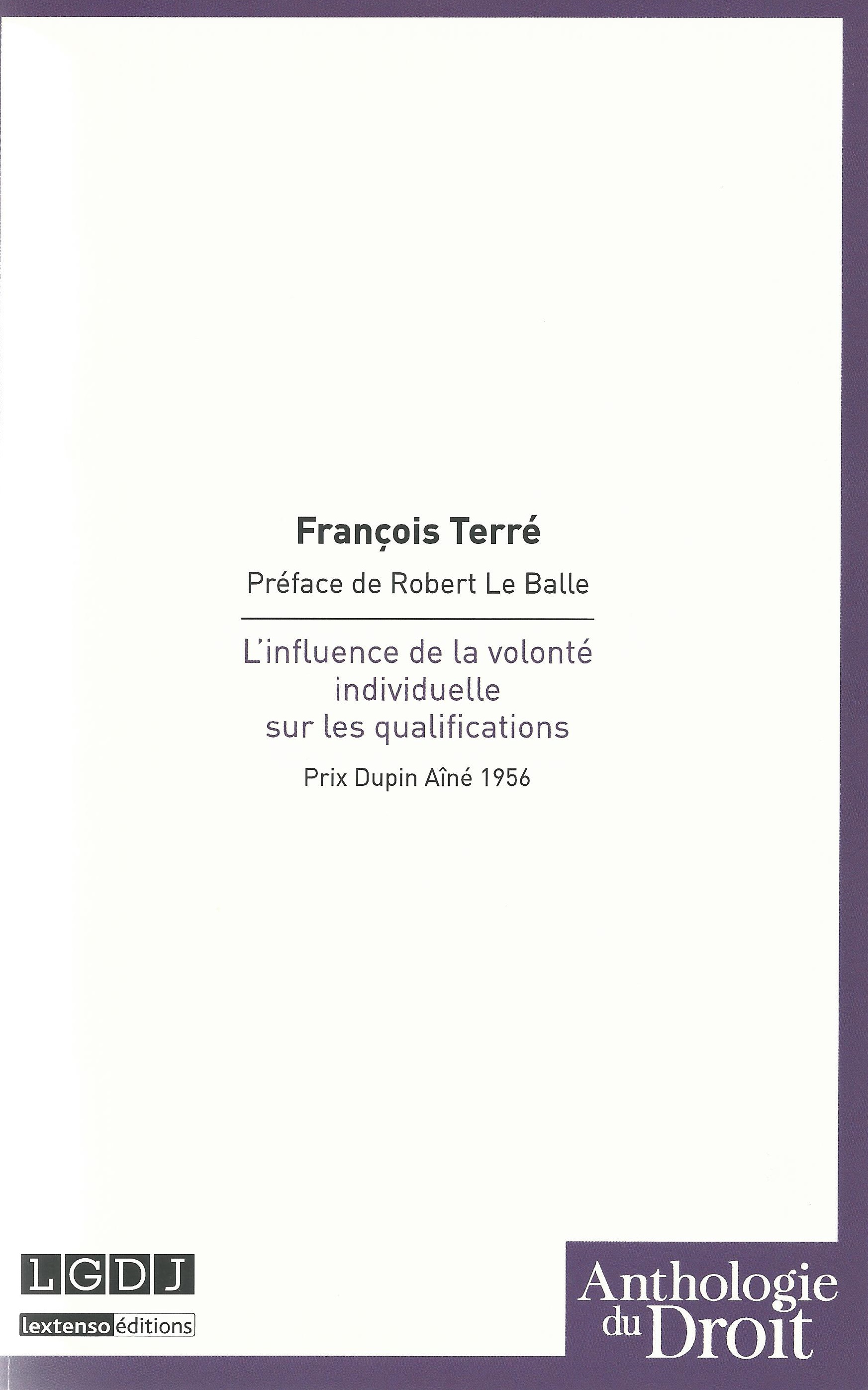 Il s'agit du travail de référence en matière de qualification, même s'il aborde la question de la qualification sous un angle particulier, à savoir le pouvoir que les personnes ont d'infléchir l'appréciation par le droit d'une situation, ce qui a pour effet de la soumettre à tel ou tel régime juridique.
Il s'agit du travail de référence en matière de qualification, même s'il aborde la question de la qualification sous un angle particulier, à savoir le pouvoir que les personnes ont d'infléchir l'appréciation par le droit d'une situation, ce qui a pour effet de la soumettre à tel ou tel régime juridique.
François Terré montre que pour les personnes, notamment les contractants, le déclenchement du régime juridique n'est plus alors l'effet de la qualification, mais l'objet recherché par la volonté individuelle, qui choisira telle ou telle qualification afin d'atteindre le régime juridique qui convient à la personne ou de se soustraire à celui qui ne lui convient pas.
La qualification est alors un "biais" pour atteindre un résultat, ici la satisfaction de l'intérêt personnel.Mais le système juridique peut refuser une telle flexibilité au nom de l'ordre public.
François Terré montre l'efficacité de la volonté pour disposer des éléments objectifs qui constituent la structure d'une qualification, afin que ce mécanisme satisfasse les buts recherchés par les personnes, le caractère objectif de cette structure n'entravant pas cette utilisation par les parties de la qualification pour obtenir le résultat qu'elles ont posé.